Building skilled sales professionals directly impacts your company’s bottom line. A solid sales team drives consistent revenue growth, improves customer retention and helps your SMB outpace competitors.
In this article, you’ll learn the essential skills sales professionals need to do their jobs effectively. Discover how to support their development to see your business succeed with targeted training, regular feedback and effective sales technology.
What is a sales professional and what are they responsible for?
A sales professional generates revenue by guiding potential customers through the buying process. They’re responsible for identifying prospects, understanding customer needs, closing deals and maintaining customer relationships.
The exact duties of a sales professional vary based on company size and structure. In a small business, a sales professional might handle the entire sales cycle – from finding leads to customer support.
In a large enterprise, specialized roles (like sales representatives and customer service reps) might split these tasks between them.
Responsibilities also vary depending on the type of sales professional. Here are some typical roles that sit within the “sales professional” umbrella:
Sales representative | Sells products or services directly to customers, often managing the full sales cycle from initial outreach to finalizing deals. |
Oversees a team of sales professionals and guides them throughout their day-to-day work. They also develop sales strategies to hit business and sales goals. | |
Focuses on top-of-the-funnel (TOFU) activities, like identifying and qualifying inbound and outbound leads for account executives to close. | |
Account executive (AE) | Manages bottom-of-the-funnel (BOFU) activities, picking qualified leads from SDRs and closing deals. |
Handles outbound sales lead generation and strategic partnership opportunities to improve sales success. | |
Works post-sale to ensure client satisfaction, boost retention and drive upsells. |
Each role is critical to a company’s client-getting system and its broader sales process. Together, they help businesses attract, convert and retain customers.
The must-have skills of successful sales professionals
A high-performing sales team needs a core set of skills. Strong communication, relationship-building and problem-solving help sales reps drive consistent revenue.
Take a look at these key skills (and others) in more detail:
Communication skills and active listening. Sales reps must clearly explain how a product or service solves a customer’s pain point. They also need to listen to understand what the problem is. Active listening helps reps uncover needs, develop trust and tailor sales pitches accordingly.
Relationship building. Strong relationships lead to trust, which drives sales. Building relationships also reduces churn and boosts customer retention – crucial for smaller businesses with limited budgets.
Problem-solving and adaptability. Sales professionals must think on their feet to handle objections, adjust their approach and offer tailored solutions. This flexibility increases the chances of closing deals and prevents potential clients from leaving the pipeline when challenges arise.
Time management and self-motivation. Good time management ensures no opportunities slip through the cracks, while self-motivation keeps momentum going during long sales cycles or quieter periods. These traits help sales professionals stay productive and consistently hit their targets.
Tech-savviness (or ability to learn). Sales technology like CRM systems help sales professionals manage pipelines, monitor deals and track customer interactions from a central location. Reps who can quickly learn and adapt to these tools work more efficiently and close sales deals faster.
To boost sales tool adoption, choose simple customer relationship management software that’s intuitive and quick for your team to learn.
Pipedrive, for example, prioritizes ease of use. Its clean interface allows users to navigate the platform without technical expertise.
For instance, use the drag-and-drop feature to move leads through the pipeline. Or create simple automations to progress them to different deal stages based on actions like email opens, form submissions and completed tasks.
Here’s an example of how a sales pipeline looks in Pipedrive:
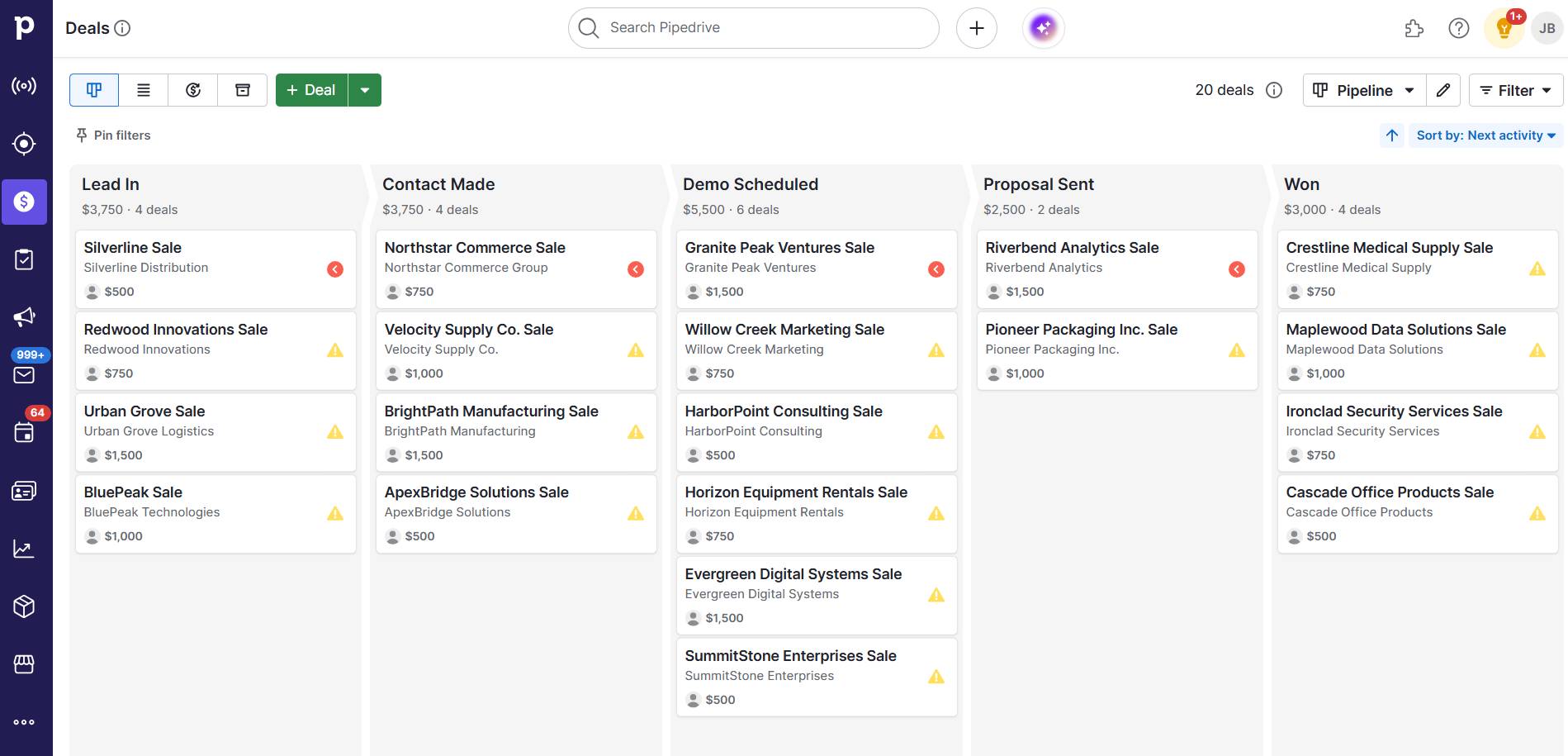
This level of visibility helps teams organize leads, spot business bottlenecks and focus their efforts on the deals that are most likely to succeed.
5 ways to support sales professionals and maximize their potential
Sales professionals perform best with the right encouragement, tools and environment to succeed. From training and technology to goal setting and feedback, here are five practical ways to help your team consistently close more sales.
1. Invest in professional qualifications
Formal sales certifications are structured training programs that teach proven sales methodologies. These qualifications boost confidence and performance by giving sales reps the tools to handle pipelines, objections and deals more effectively.
Here are a few popular sales certifications worth considering:
Certified Professional Sales Person (CPSP) | Focus: Mindset, communication techniques and sales psychology. Ideal for:
|
Metrics, Economic Buyer, Decision Criteria, Decision Process, Identify Pain and Champion (MEDDIC) | Focus: Lead qualification in complex B2B sales environments. Components: In-depth training sessions (online or in-person), case studies and interactive coaching. Ideal for:
|
Focus: Tailoring messaging and leading high-stakes sales conversations using the Challenger approach. Components: Interactive workshops, online learning modules and real-world application exercises. Ideal for:
|
These certifications are helpful when onboarding new hires or leveling up experienced reps. However, many SMBs don’t have the budget or time to enroll sales teams in formal programs.
The good news is that there are cost-effective alternatives (outlined in the following sections) that can boost sales performance.
Note: Formal certifications don’t guarantee success on the sales floor. When hiring or evaluating sales talent, it’s equally important to consider personality traits like resilience, curiosity and empathy, as well as actual sales experience.
2. Use on-the-job learning and shadowing
An effective (and budget-friendly) way to develop sales talent is through on-the-job learning. Practical experience helps sales reps build confidence, refine skills and adopt best practices from real-world situations.
SMBs can foster a strong learning culture by building sales mentorship, shadowing and hands-on experiences into everyday workflows. Here are some actionable ways to do this:
Set up regular shadowing sessions. Let junior reps observe top performers on sales jobs like discovery calls, sales demos and negotiations. Rotate who they shadow to expose them to different sales styles.
Encourage side-by-side calling. Pair reps to make live sales calls together, alternating who leads and who listens. Afterward, discuss what worked and what to improve.
Run weekly deal reviews. Host short sessions where reps walk through real pipeline opportunities, share challenges and get feedback. Use these reviews to reinforce good habits and identify improvements on stuck deals.
Assign mentors to new hires. Match new reps with experienced mentors for informal coaching and ongoing support. Encourage regular check-ins to answer questions and build confidence early on.
Use call recordings as training tools. Review past calls together to highlight good practices or areas for improvement. Focus on structure, objection handling, tone and how reps guide conversations.
Create a “win library”. Store examples of successful emails, pitches and recorded calls in a shared folder. Make it easy for reps to access and learn from top-performing content whenever they need inspiration or guidance.
Building these processes into daily workflows helps new and developing reps gain real insight into what works at each stage of the sales cycle – without needing a large learning and development (L&D) budget.
Note: Pipedrive’s CRM for salespeople makes it easy to store and organize successful sales documents. Use the Smart Docs add-on to centralize a shared drive directly in the CRM, allowing sales pros to access and review winning sales records.
3. Create a simple but consistent feedback loop
Consistent employee feedback gives sales professionals timely insights into what they’re doing well and where they need to adjust. The process reduces the chances of small mistakes becoming long-term habits.
For example, if a sales rep regularly loses leads during negotiation, reviewing their recent calls might reveal they’re not handling objections confidently.
With weekly coaching focused on objection handling, they refine their approach, practice responses and start winning more customers.
4 free sales feedback templates
Here’s how sales leaders and business owners can build regular evaluations into business operations:
Schedule regular 1:1 check-ins. Block out 15–30 minutes each week to discuss wins and challenges with each rep. Regular touchpoints build trust and keep development top of mind, making feedback a natural part of your team’s weekly rhythm.
Use deal reviews to drive learning. Pick a live opportunity from each rep’s pipeline and walk through them together. Reviewing deals grounds critique in real situations, helping reps course-correct quickly and apply lessons immediately.
Focus on one skill at a time. Identify a key area (like deal closing or sales discovery) and center feedback around it for a few weeks. Narrowing the focus helps both manager and rep track progress more clearly, making suggestions more actionable and less overwhelming.
Give input immediately after key interactions. Use quick post-call debriefs or instant messages to highlight strengths and small areas for improvement. Timely input reinforces good habits and corrects issues before they become patterns.
When building a consistent feedback loop, it’s essential to have clear visibility into your team’s activity. This visibility ensures you base feedback on real, up-to-date performance data.
Pipedrive makes it easy to track sales activity in real time. Managers can access every rep’s live sales dashboards, activity logs and deal progress, allowing them to deliver targeted, timely coaching.
Here’s an example of a sales dashboard in Pipedrive, which you can filter by user to view individual rep performance:
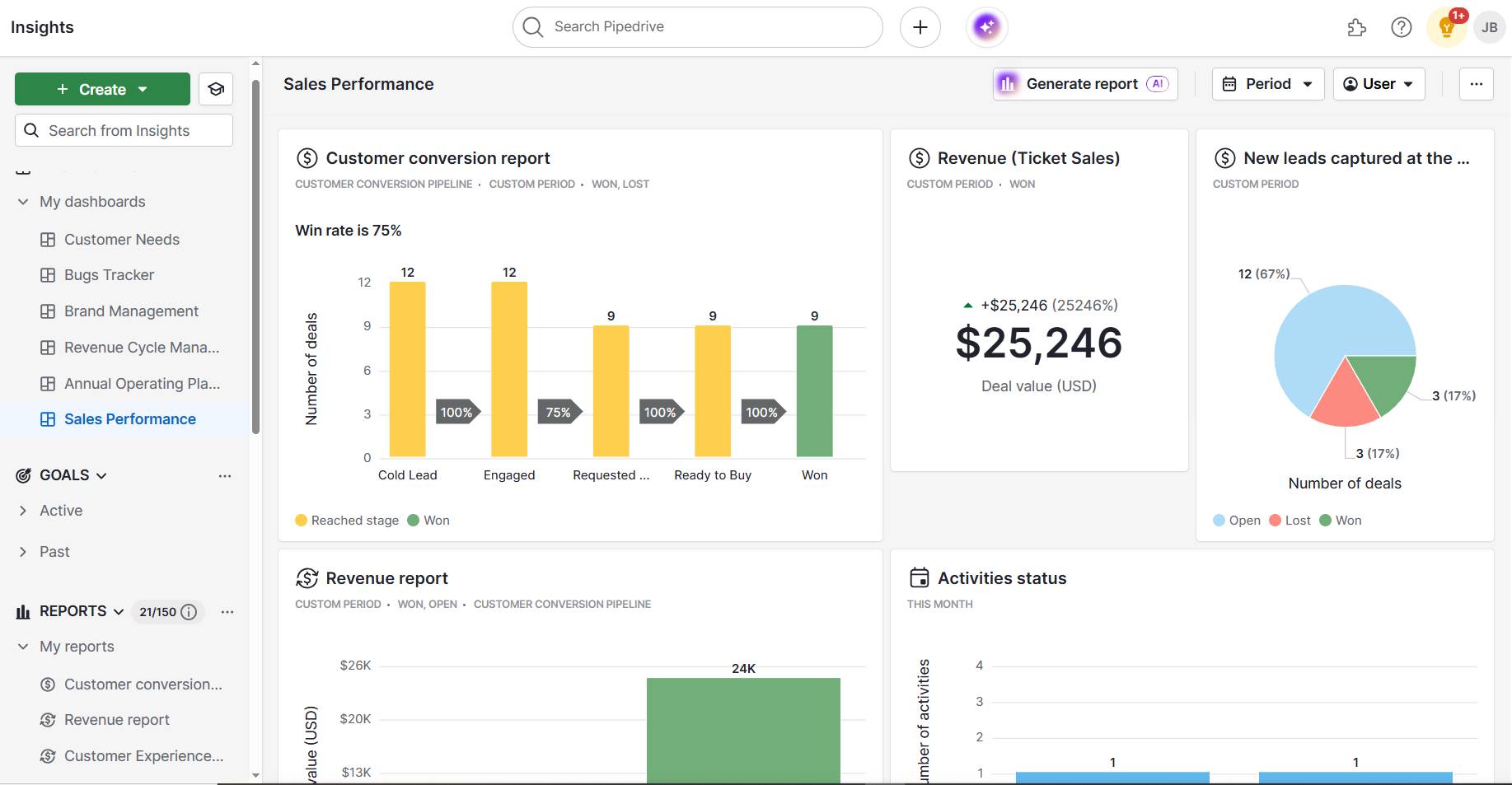
You can also schedule recurring 1:1s with each rep in Pipedrive. The calendar sync feature adds external calendar activities directly to your CRM.
As a result, business leaders and sales professionals don’t have to manually find the best time to meet. The system automatically schedules meetings on their behalf.
Here’s how these meetings appear in Pipedrive:
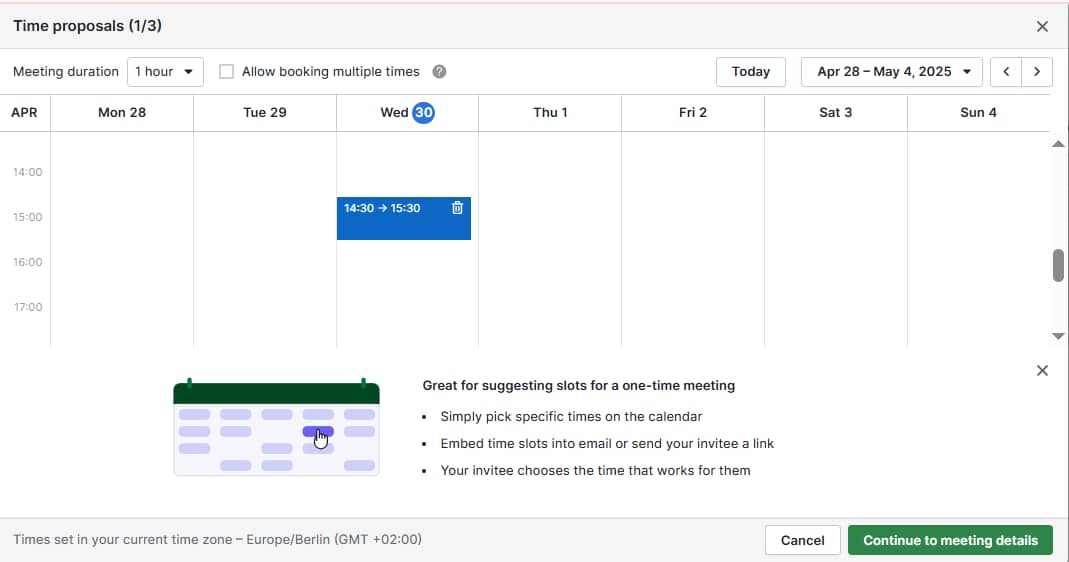
These Pipedrive features help you create a consistent feedback loop, giving your sales team the skills and confidence to close more deals.
4. Tap into free or affordable resources
Sales training doesn’t have to carry a hefty price tag. There are high-quality, free (or low-cost) tools available for sales leaders and business owners to learn more about sales and sharpen their teams’ skills.
Here are some ways to make the most of free resources:
Start a dedicated learning channel. Make channels in your communication platform (like Slack or Microsoft Teams) to share bite-sized insights, videos or blog posts with valuable sales information. These messages keep development front of mind without overwhelming reps.
Encourage free course enrollments. Platforms like Coursera and LinkedIn Learning offer free sales fundamentals and CRM training. These online sales courses provide structured content from industry experts, helping sales professionals strengthen core skills.
Attend live (or recorded) webinars. Sign up for sessions from reputable sales sources on different sales topics. Pipedrive, for example, hosts regular sales and CRM webinars on topics like “The hidden science behind every ‘yes’: Influencing secrets for salespeople”.
Create a shared learning hub. Use a document storage system for useful sources and information. Organize them by skill area to make them easy to find, including objection handling, sales prospecting and closing techniques.
Use Pipedrive’s document management features to create a central hub for your resources. Upload PDFs, share article links or embed video libraries in one place. Integrate with Google Drive to organize these documents directly in the CRM.
Here’s an example of Pipedrive documents in Google Drive:
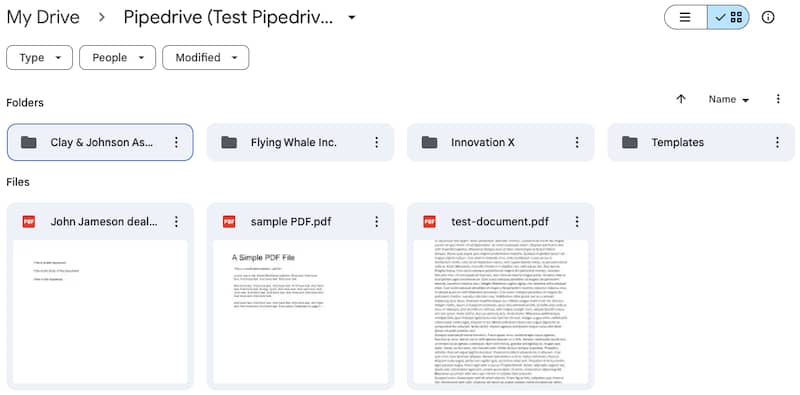
With everything centralized, sales teams can easily keep learning without switching platforms.
5. Use the right CRM to support skill development
A good CRM reinforces strong sales habits, supports coaching and helps reps learn from their activity. When salespeople can see their progress, they’re more likely to improve performance and close deals consistently.
Here’s how sales leaders can choose (and use) CRM providers that actively support development:
Allow reps to learn from their data. Look for systems with dashboards and deal histories that are easy to filter and analyze. These insights help reps spot what works and where they’re falling short, turning performance data into actionable next steps.
Use built-in automation. Find a CRM that uses automation to reduce manual work. When you automate repetitive tasks (like data entry or follow-up emails), sales professionals can dedicate more time to learning through live interactions, refining their techniques and analyzing what works.
Customize your sales process. Choose a CRM that lets you tailor the pipeline to match your sales process. When the CRM reflects your team’s exact steps, sales professionals can develop consistent habits and better understand each stage.
Pipedrive makes it easy to customize your pipeline to fit your sales process. You can create, rename or reorder deal stages, so the system mirrors how leads move through your sales funnel.
Here’s an example of a custom sales pipeline in Pipedrive:
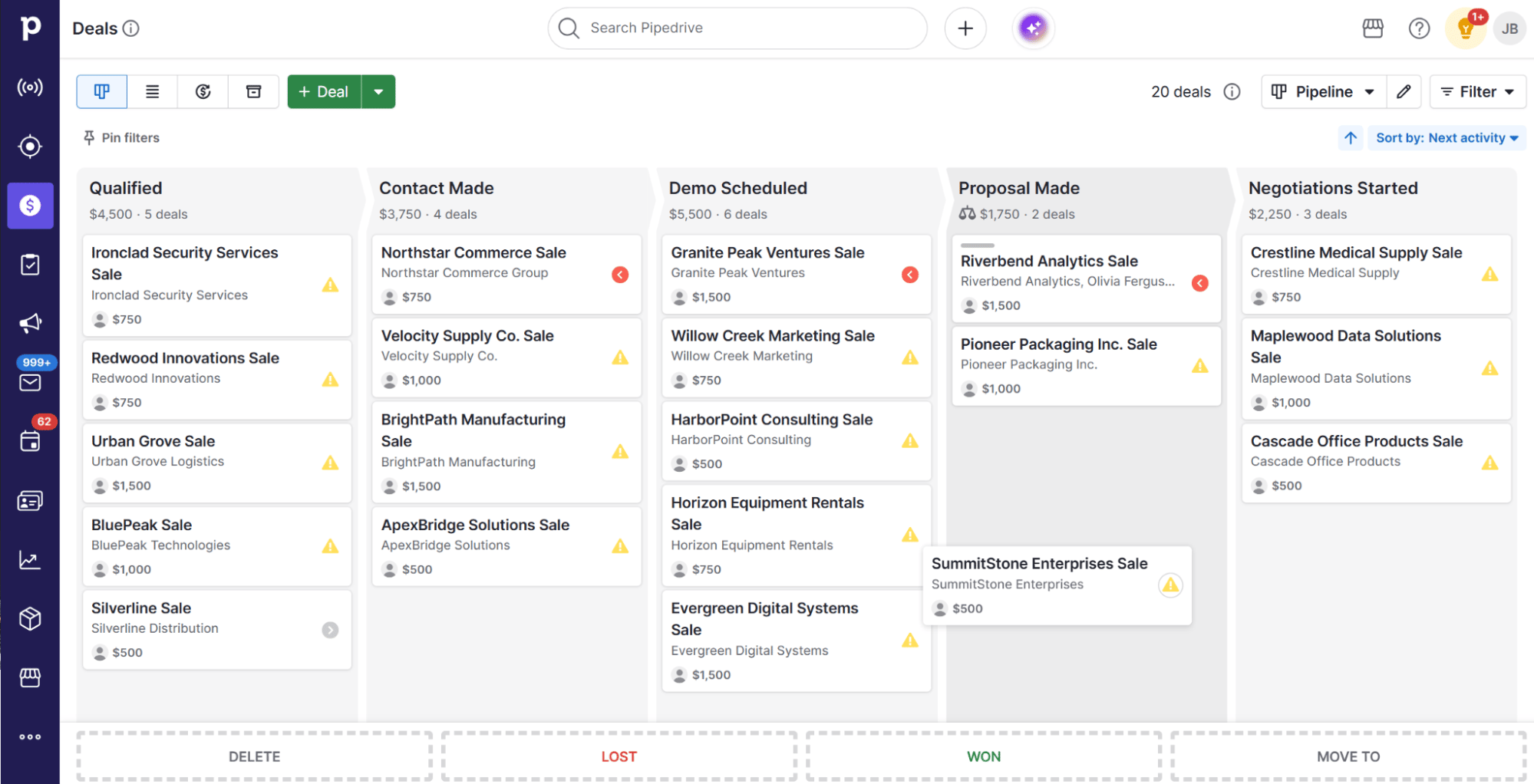
You can also use Pipedrive automation to speed up the sales pipeline. For example, instantly assign new leads to specific team members based on custom criteria like deal value, location or product interest.
Here’s an automatic assignment in Pipedrive based on currency:
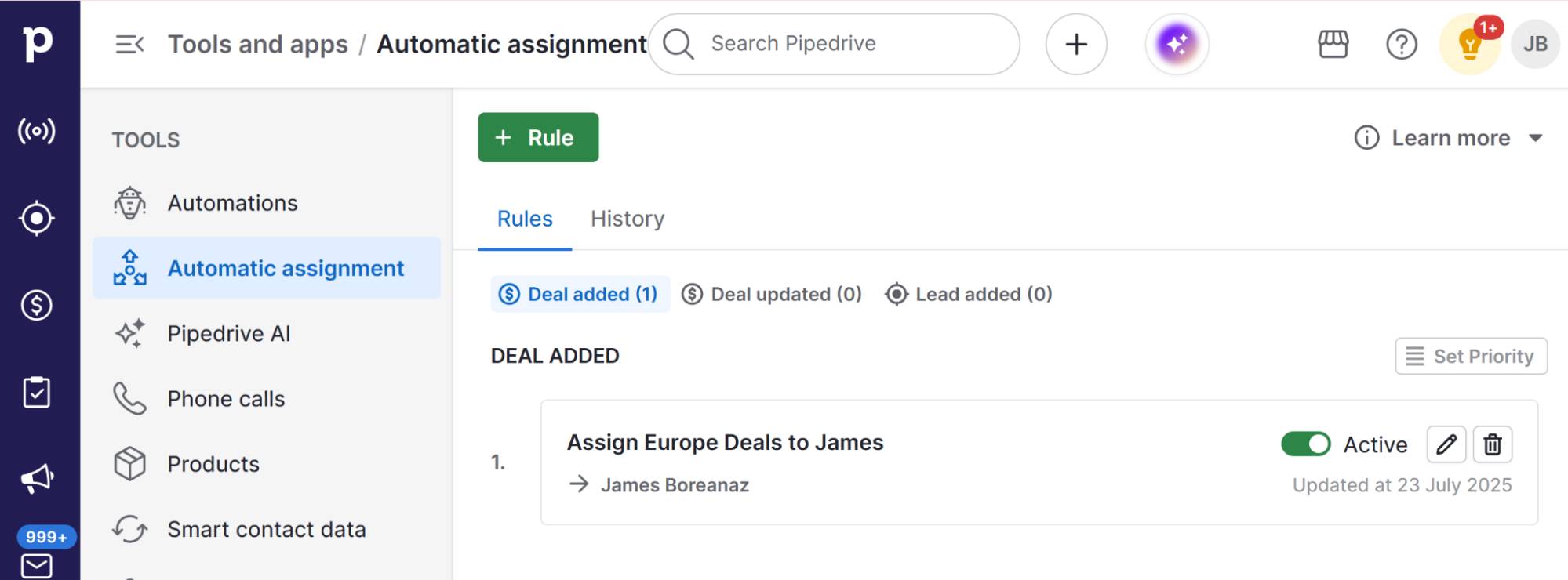
This automation keeps the pipeline flowing smoothly, so reps focus on more crucial tasks like nurturing leads and growing their sales skills.
Final thoughts
Sales professionals succeed through ongoing training, regular feedback and opportunities for practical learning. Tools like Pipedrive sharpen their skills while helping them stay focused on what matters most: closing deals and growing business opportunities.
Use Pipedrive to simplify pipeline management, automate repetitive tasks and give reps clear visibility into their performance. Sign up for a free 14-day trial to uncover exactly where your team can improve to land more deals.






